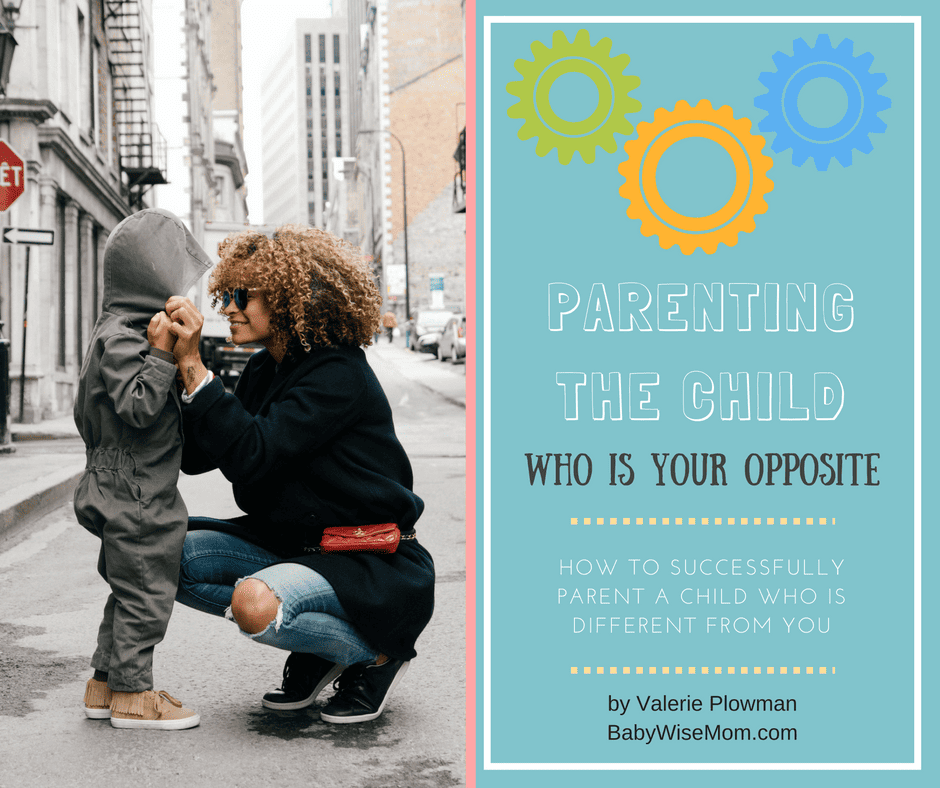Parenting the Child Who is Your Opposite
Today Valerie from Chronicles of a Babywise Mom is guest posting here. I actually specifically requested her to write a post on this topic today!
A good friend and I were recently talking about our most difficult children to parent and how their personalities are nothing like our own.
I really think there is a connection there and KNEW Valerie would offer some amazing insight…and (no surprise here!) she didn’t disappoint!
Awesome post and I’m thankful to her for writing it!

Parenting the Child Who is Your Opposite
by Valerie Plowman
Parenting a mini-you can be quite easy.
Even if you are a difficult type of person, and your own mother had fits with you, you know you.
You know what your intentions are. You know what makes you tick.
You know what makes you ticked. You know what motivates and inspires you.
You know what makes you freeze up. You know your own game and you can play it.
What about that child who is different from you. What about the child who is your opposite?
The child you do not understand. The child that leaves you baffled and you have no idea why he/she makes those choices.
I have a couple of close carbon copies of myself.
They
I also have one very, very different from myself.
She is for sure my most difficult child to parent. For many parents, the child who is different from them is the most difficult child to parent. Let’s talk about how to handle this.
Learn To Walk In Their Shoes
One of the most beneficial skills in life is to learn to understand the perspective of others.
People see the world differently. You can I can witness an event and have vastly different interpretations of what happened.
We see the world differently, we feel differently, and we react differently. And that is all okay. Try to understand life from the perspective of your individual child.
When you try to do things for a person for how you want to be treated, you don’t treat them in the way they prefer.
Let me illustrate with a simple example.
My husband loves surprises. I don’t really like surprises at the last minute.
If I were to get a surprise trip, for example, I would enjoy it a hundred times more if I had a least a week to think about it first.
Being told I am leaving and heading right out causes me a lot more anxiety than enjoyment. Also, for
For years, my husband did things for me that were last minute surprises.
I appreciated the
Now he fills me in on the plans earlier, and I enjoy them so much more!
Get to Know the Child
If you want to see life from your child’s perspective, you have to know what your child is like.
Does your child like spontaneity or consistency? Does your child like noise or quiet?
Is your child an introvert or extrovert? How does your child feel around new people?
What makes her happy? What makes her upset?
If you want to be able to see her perspective and understand it, you have to know who is she is.
Get to know your child’s love language. What can you do to show him love?
What will mean the most to him? Another important area to understand is birth order.
I am
Whenever a mom is frustrated with these quirks and talking to me about them, I let them know how common and typical that is of a first born and try to help her see the why behind the child’s actions.

Talk to People With Similar Personalities as Your Child
My husband and I are basically opposite personalities.
We have similar morals, values, and lifestyles, but our personalities are pretty much the exact opposite of each other.
Each of our four letters is the opposite of each other.
I have a dear friend from high school who is the same personality as Nate, and her husband is
She and I would talk a lot in our early years of marriage about ourselves, and it would help us to understand our husbands better.
For some reason, there is just something that makes sense when a woman is explaining to me what makes her tick. It helps me get what makes my husband tick, also.
Once you understand what your child is like, find a friend of yours who is similar.
Talk about life and why they do what they do. It will help you understand the motivation and thinking behind your child’s actions.
I am very extroverted, and I love talking to friends who are introverts. They help me understand the needs of my introverted children.
Have Patience and Assume the Best
Most of the time, most people are not trying to be annoying and not trying to hurt others.
Even if your child is reacting in a way that is totally opposite of how you would react, it doesn’t mean that your child is doing it to annoy you.
Take what you know of your child to help you understand why this reaction is happening and try to see the situation from her perspective.
Recognize How You Compliment Each Other
The amazing thing about our opposites is that they compliment us well.
They help us step out of our comfort zones and teach us a different way to see the world.
Recognize those ways that you compliment each other and it will help you have gratitude for this difference rather than frustration.
Conclusion
While you might have an easier time with the mini-you, the opposite-you can teach you so much about life and help you to see the world in a whole new way, making you a better person all around. Cherish this gift and learn all you can from it.
Valerie is a mother to four, ages 4-11, and blogs at BabyWiseMom.com.
- A Letter to my Son on His 16th Birthday From Mom (Kye’s Bday Letter) - March 20, 2025
- Open Letter to my Daughter on her 12th Birthday – Love, Mom {Britt’s 12th Bday Letter} - January 16, 2025
- Letter to My Son on his 6th Birthday – Love Mom - January 8, 2025






